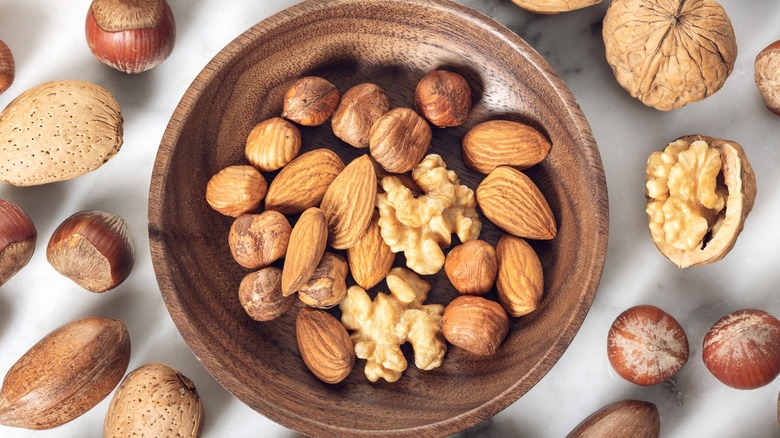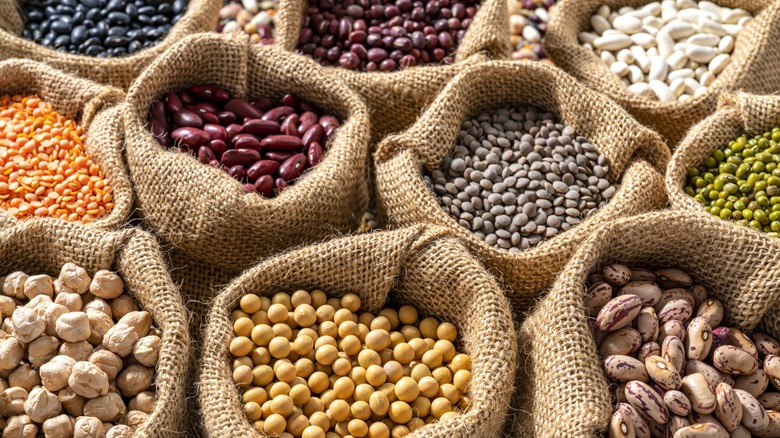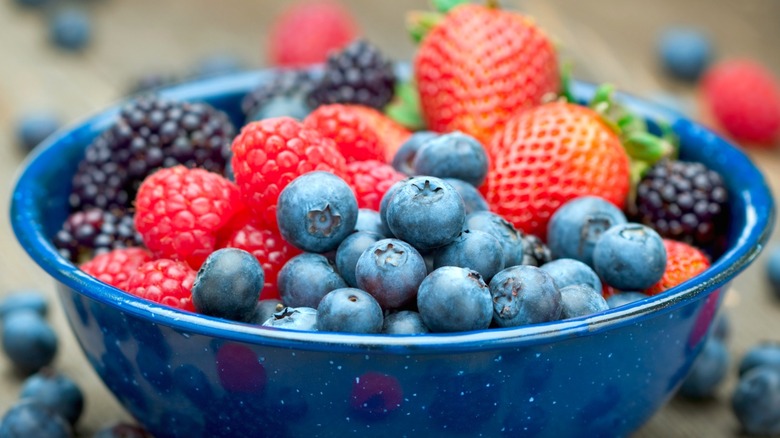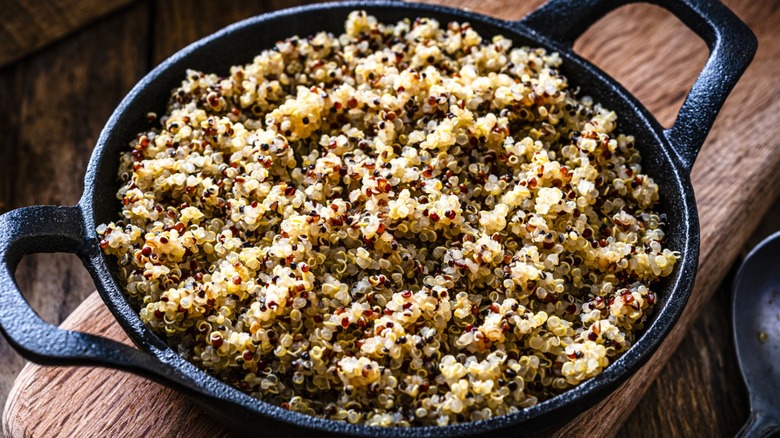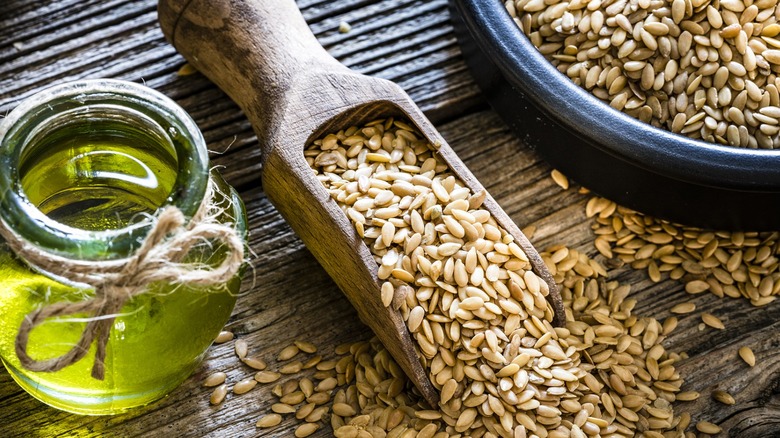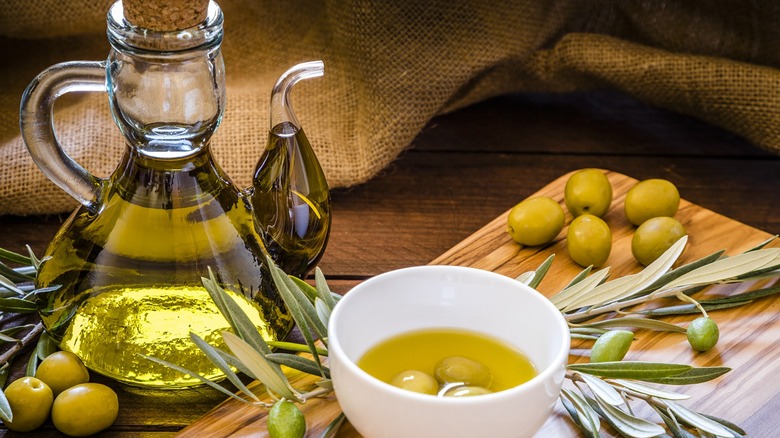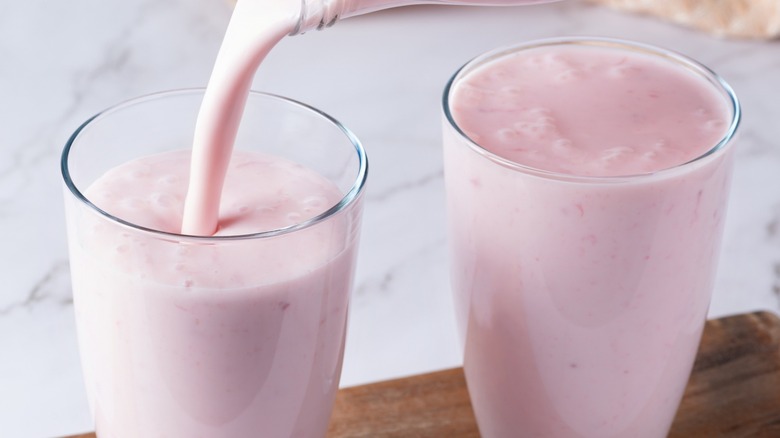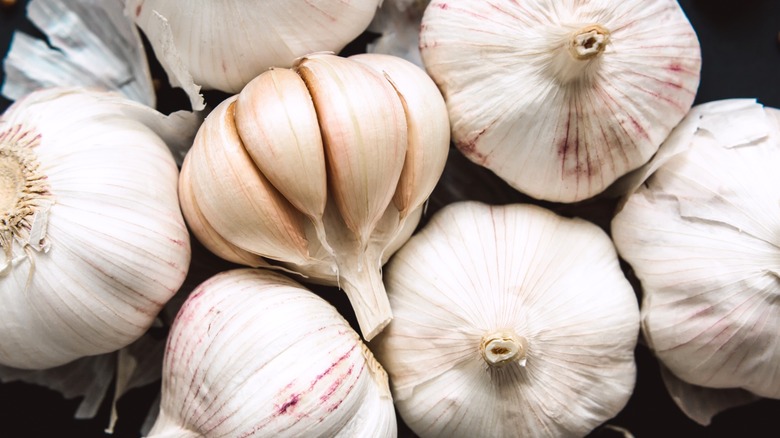Not Eating These 11 Foods Can Increase Early Death Risk
The food we consume is about more than satisfying our taste buds. As the maxim goes, "You are what you eat," and so the food and beverage choices you make will also have a meaningful impact on your daily health and the length of your life. Results from a recent clinical study published in the European Health Journal back this up, revealing that maintaining a healthy diet can lower your mortality risk.
Health experts agree that eating a wide variety of healthy foods is vital for protecting against the risk of developing cardiovascular disease (CVD) and other serious health conditions.
Certain foods have more benefits than others, but the team at Better Health reminds readers that consuming recommended amounts of foods from each of the five food groups — fruits, vegetables, lean proteins, dairy, and grains — is still the best approach to maintaining overall health because of the wide range of nutrients that support the complex functions that take place throughout your body.
The MyPlate initiative, an approach to healthy eating recommended by the U.S. Department of Agriculture, advises on the best ways to fill your plate. Specifically, half your plate should be fruits and vegetables, and the other half should include grains and a certain amount of protein depending on your sex, height, weight, and physical activity.
Even so, there are particular foods in each food group that you should include regularly and in sufficient quantities to maintain a balanced diet while also increasing your chances of avoiding health risks that could shorten your lifespan.
Fatty fish
Fatty fish like salmon are chock full of omega-3 fatty acids, which support heart health by lowering triglycerides, a type of fat in your blood. Moreover, consuming fatty fish improves cholesterol levels and can reduce the risk of developing an irregular heartbeat.
Considering how vital omega-3 fatty acids are to supporting essential functions, you'd think your body would produce them on its own — yet it doesn't. So you need to look at foods that naturally contain these "healthy fats." The team at MedlinePlus points out that in addition to supporting a healthy heart and blood vessels, omega-3 fatty acids may also play a role in managing cancer, depression, and inflammation.
Cardiologist Alyson Kelley-Hedgepeth, M.D. explains in an article she authored for Harvard Health that eicosapentaenoic acid (EPA) and docosahexaenoic acid (DHA), two central omega-3 fatty acids inherent in fatty fish and fish oil, are linked to reducing the risk of CVD in individuals who have a history of heart conditions. However, she notes that more research is needed to confirm whether fish oil supplements reduce the risk of cardiac events, advising that you should get your omega-3 fatty acids through food rather than supplements.
Getting the recommended amount of omega-3 fatty acids in your diet by eating fish isn't a heavy lift. You only need to eat between one or two servings weekly, which adds up to two 3.5-ounce servings or one 7-ounce serving per week. Besides salmon, you have several omega-3-rich oily fish to choose from to meet this threshold, including mackerel, albacore tuna, trout, and sardines, per MedlinePlus.
Nuts
If you love nuts, you're in luck! Almonds and walnuts, in particular, are loaded with heart-healthy monounsaturated and polyunsaturated fats, which are unsaturated fats (also known as "good" fats) that can lower the risk of heart disease. Additionally, the experts at the Mayo Clinic explain that almonds and walnuts contain fiber and antioxidants, compounds that protect your cells against unstable molecules called free radicals that can increase your risk of inflammation and heart disease. Research also supports the power that certain nuts possess to reduce the inflammation associated with diabetes.
Moreover, data suggest that the unsaturated fats in nuts can lower bad cholesterol levels. Nuts may also improve artery health and prevent heart attacks and strokes by decreasing the risk of blood clots. Eating nuts can also lower the risk of high blood pressure and early mortality as a result of heart disease. Regularly munching on nuts can also lower triglycerides and the "bad" cholesterol, low-density lipoprotein (LDL). Many nuts also contain fiber, which not only helps lower cholesterol but can help you maintain a healthy weight by making you feel full, per Mayo Clinic.
While you can't go wrong eating the recommended amount of walnuts or almonds, Healthline notes that each nut has unique strengths. For instance, if your main focus is weight loss or managing blood sugar, research suggests that you stick with almonds. For boosting brain health, walnuts are the best choice. So enjoy either almonds or walnuts regularly to support heart health and reduce heart disease risk.
Legumes
You may not automatically think of legumes when building up a healthy dinner plate, but this family of flowering plants, which include beans (kidney, pinto, white, black, and lima), chickpeas, split peas, lentils, and edamame (unripened soybeans) are robust sources of protein, fiber, and vitamins that support heart health. Legumes can also help lower cholesterol and manage blood sugar, reducing cardiovascular risk.
In 2019, a review of clinical trials published in Advances for Nutrition assessed how eating legumes can impact the development of CVD and other health conditions. The results reaffirmed previous evidence supporting the potential benefits that legume consumption has related to CVD and associated factors such as high blood pressure, obesity, and dyslipidemia (an imbalance of HDL, LDL, or triglycerides) in your blood. Additionally, the analysis revealed that eating legumes may also have a beneficial association with stroke and type 2 diabetes.
Though legumes have been an essential part of the human diet for thousands of years and are an inexpensive source of protein and key nutrients, per capita consumption remains below the expert recommendations of Dietary Guidelines for Americans, according to a study published in Frontiers in Nutrition.
The good news is that this is easy to remedy. Simply consuming half a cup of legumes two to three times a week can go a long way toward protecting against chronic disease, according to experts at the Grains & Legumes Nutrition Council. For instance, swap out fatty blue cheese dip for hummus or replace that bag of potato chips with bean salad, and you'll be on your way!
Berries
The Centers for Disease Control and Prevention (CDC) reports that heart disease is the leading cause of death in the United States, accounting for one in every five deaths in 2021. Consider enjoying sweet berries as a delicious way to keep heart problems at bay and avoid being part of this statistic. For instance, blueberries are packed with nutrients that can help lower the risk of heart attacks. Additionally, blueberries can help lower your LDL cholesterol and enhance artery function, according to the experts at Healthline.
Other berries also support good health. For example, Anandh Babu Pon Velayutham, Ph.D., an associate professor of Nutrition & Integrative Physiology at University of Utah Health says that making strawberries along with blueberries an integral part of your diet is a potent way to improve blood vessel function and that many studies support consuming a healthy amount of fruits and berries to stave off the onset of heart disease.
The beauty of berries is how easy it is to fold them into your weekly meal plan. For breakfast, add blueberries to oatmeal or make them the star of your morning smoothie along with Greek yogurt and flaxseeds to get in some protein and healthy fat. Or simply eat blueberries on their own as a snack. A rich source of vitamin C, enjoy strawberries in a green salad or a cup of yogurt, or blend them with blueberries, raspberries, blackberries, honey, lime juice, and poppy seeds for a healthy, yummy fruit salad.
Quinoa
A high-protein option rich in fiber, vitamins, and minerals, quinoa is such a healthy food, that Harvard Health deemed it a "Seed of the Month." Consuming quinoa not only improves heart health by reducing the risk factors for CVD but also helps with weight management and lowering obesity risk.
Hailing from South America, this small seed that comes in an array of colors earned its "superfood" reputation due to its notable nutritional properties. Though not a regulated designation, a superfood is generally regarded by the health community as a food that is nutritionally dense, linked to preventing one or more diseases, or offers other significant nutritional benefits.
One reason quinoa has earned the superfood moniker is that it is a complete protein, meaning it is a protein that contains all nine amino acids — the components that make up protein — that humans are unable to produce on their own. A cup of these white, yellow, red, and black seeds provides approximately 8 grams of protein along with about 5 grams of fiber. Quinoa is also rich in minerals such as manganese, phosphorus, and copper, making quinoa an essential part of your diet can help reduce heart risk, per Harvard Health.
Simply Quinoa explains that quinoa is easy to cook as a side dish instead of rice. As with rice, add one cup of quinoa to two cups of water and boil for eight to 12 minutes. When you're ready to feature quinoa in your recipes, fans of quinoa suggest quinoa mac and cheese, quinoa buddha bowls, and quinoa dark chocolate cookies.
Flaxseeds
Little yet mighty, flaxseeds pack a big, healthy punch. This seed of the flax plant that ancient Egyptians used for food and medicinal purposes can help reduce inflammation, lower blood pressure, and improve cholesterol profiles, according to the experts at Cleveland Clinic. These benefits are thanks to flaxseeds being inherently rich in alpha-linolenic acid (ALA), a type of plant-based omega-3 fatty acid. Flaxseeds are also a great source of fiber, which aids in digestion and can support heart health.
The mild, nutty flavor of flaxseed can easily fit into your weekly culinary plans in multiple ways. For instance, just a sprinkle of flaxseeds can add a nutritional boost to your morning yogurt, cottage cheese, oatmeal, or smoothie. Similarly, top your lunch salad with flaxseeds for added flavor. Flaxseeds also blend well in sauces, soups, and baked goods, such as muffins and pancakes.
In addition to its positive impacts on heart disease and cholesterol, the Mayo Clinic staff notes that research indicates that flaxseeds can potentially reduce blood sugar levels in individuals with type 2 diabetes.
Even so, while flaxseeds have potential health benefits, experts caution against overconsumption. When eaten in larger amounts and without adequate water, flaxseeds can cause bloating, gas, and diarrhea. Additionally, they advise avoiding flaxseeds during pregnancy, if you have certain allergies, and two weeks before surgery since flaxseed oil can potentially reduce blood clotting. If you're on medication, check with your doctor before consuming flaxseeds or flaxseed oil, as interactions with certain drugs may cause side effects, per Mayo Clinic.
Olive oil
A dietary staple used in cooking and dressings in Mediterranean regions, olive oil is not only delicious, but it's also healthy for your heart, especially extra virgin olive oil, which undergoes less processing. The tasty golden liquid contains monounsaturated fats and antioxidants, which can improve cholesterol levels, reduce inflammation, and lower heart disease risk.
A review of data from 13 studies published in 2022 by Frontiers in Nutrition revealed that CVD and olive oil consumption are inversely related, meaning the increase of olive oil in your diet will reduce the chances of developing CVD risk factors such as obesity, diabetes, and coronary artery disease, among other health conditions. Consequently, substituting extra virgin olive oil for other fats can improve human health and longevity. The results suggested that consuming 20 grams of olive oil per day is optimal, though the researchers note that exploration in future studies may provide a greater understanding of why and to what extent this serving of olive oil produces health benefits.
Though you may be used to pouring olive oil over your salad or into a saute pan, believe it or not, you can now also get some or all of the recommended daily serving of olive oil in your morning joe. The New York Times reports that Starbucks started a line of coffees infused with extra virgin olive oil. If you want to add a little pizzazz to olive oil when preparing garnishes and sauces, include a touch of honey in the mix, per Forbes Health.
Milk
A rich source of calcium, potassium, and vitamin D, dairy milk is essential in helping to regulate blood pressure, manage blood vessel function, and maintain overall heart health. Consequently, omitting a daily serving of milk can potentially increase the risk of an earlier death.
A cohort study published in 2021 demonstrated the connection between consuming high quantities of dairy and a lower risk of heart and circulatory diseases. The study, which included 4,150 Swedish individuals, all aged 60 years, used blood tests to detect specific fatty acids associated with dairy consumption. Scientists then tracked the participants for roughly 16 years. The results revealed that those with higher levels of dairy fatty acids experienced the most significant reduction in their risk of heart and circulatory diseases.
There are many ways to get the benefits of dairy milk beyond simply drinking it. For example, at breakfast, opt for milk in unsweetened cereal or a bowl of oatmeal rather than water. Include milk as an ingredient in your lunch or dinner by adding it to quiche or mashed potatoes, per the U.S. Department of Agriculture.
For coffee and tea drinkers, the team at LSU AGCenter supports adding milk to your morning cup of caffeine as part of your daily serving. However, they advise sticking to low-fat or skim milk as opposed to whole milk to reduce your fat intake. If you have issues with drinking dairy milk due to lactose intolerance, you have options. Try consuming smaller quantities of milk, or switch to fortified soy milk. Alternatively, there are many lactose-free milk options available.
Yogurt or kefir
A probiotic-rich dairy product that contains beneficial live cultures, yogurt can help maintain a healthy gut microbiome. Probiotics are good bacteria that can also contribute to improved digestion and general well-being. Additionally, consuming yogurt is linked to reduced inflammation and a lower risk of developing heart disease.
Yogurt originated in eastern Asia and the Middle East, with references in Indian medical texts dating as far back as 6000 BCE. Derived from the Turkish word yoğurmak (meaning to thicken, coagulate, or curdle), yogurt is formed by combining heated milk with bacteria that transforms the sugar in the milk into lactic acid, giving yogurt its tartness. A study published in 2018 in the American Journal of Hypertension concluded that consuming two or more servings of yogurt per week and CVD risk had an inverse association in adults with hypertension (high blood pressure). Moreover, yogurt intake in combination with a diet that focuses overall on heart health may significantly reduce the risk of CVD.
In a similar way to yogurt, the team at Cleveland Clinic explains that drinking kefir (pronounced kee-feer) can also deter early death risk in a variety of ways. A fermented milk drink packed with vitamins, minerals, and nutrients such as calcium, magnesium, protein, and vitamins B2, B2, and D, kefir is made by adding good bacteria, or kefir grains. This process of adding kefir grains, which also contain yeast, converts the milk sugar to lactic acid, providing kefir with numerous nutrients. Experts state that drinking kefir may support gut health, strengthen bones and muscles, manage blood sugar, and fight illness-causing germs, per Cleveland Clinic.
Garlic
If you're concerned about scaring people away with your garlic breath, it may be worth it in the end. This delicious edible bulb boasts the superpower allicin, a compound linked to potentially lowering blood pressure, reducing the risk of heart disease, and promoting heart health.
Cultures around the globe have used garlic for thousands of years, thanks to its dynamic flavor and medicinal uses. Raw, cooked, or in supplement form, consuming garlic is an easy way to help fend off infection and prevent cell damage. Garlic intake may also reduce blood pressure, according to the experts at Providence. Additionally, researchers believe garlic may reduce the scarring and hardening of the arteries, which could potentially lead to a heart attack. Yet, the health benefits don't stop at the heart. Eating garlic may also help prevent the common cold and reduce the risk of colorectal cancer.
Getting enough garlic daily to make an impact doesn't take much. Today reports that just one five-calorie clove can do the trick. Of course, you can easily add fresh raw or sauteed garlic to a portion of pasta, but if you want to explore enjoying garlic in more creative ways, you can also get your daily clove as part of a healthy eggplant parmesan sandwich on garlic bread or in braised soy-honey-garlic chicken.
Though garlic has a lot going for it, it's not advised for everyone. For example, those with irritable bowel syndrome or gastroesophageal reflux may need to avoid garlic as it can cause digestive issues, per Today.
Dark chocolate
Calling all chocoholics! Evidence suggests that eating dark chocolate reduces your chances of developing cardiovascular disease and helps support a longer lifespan. You read that right. Chomping on chocolate is healthy. Yet, there are some caveats.
Dark chocolate can help lower blood pressure, as long as the chocolate doesn't contain a ton of sugar and saturated fat, Scripps Health reports. Studies have indicated that dark chocolate helps make blood platelets less sticky, lowering the chance of clots that can cause a heart attack or stroke. Moreover, dark chocolate can potentially prevent heart disease by controlling chronic inflammation, and also helps to process nitric oxide, a compound that supports blood flow throughout the body and brain. Additionally, dark chocolate is packed with antioxidants, making it a tasty way to fend off disease. The darker the chocolate, the better, as the cocoa in dark chocolate contains high levels of flavanols, a natural compound and subtype of flavonoids common in certain fruits, vegetables, and plants that provide numerous health benefits.
But don't overdo it. Poulina Uddin, MD, a cardiologist at Scripps Clinic notes that, as with any chocolate, eating too much dark chocolate can pack on the pounds. You don't need to eat much to reap the cardiovascular benefits. Dr. Uddin says just a small piece of dark chocolate daily can do your heart good. If you're feeling pleasure after eating dark chocolate, it's not only the taste that's making you happy. Another proven benefit of eating dark chocolate: It puts you in a good mood (per Cleveland Clinic).



